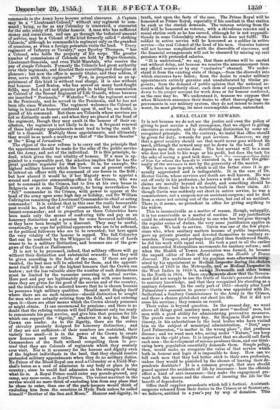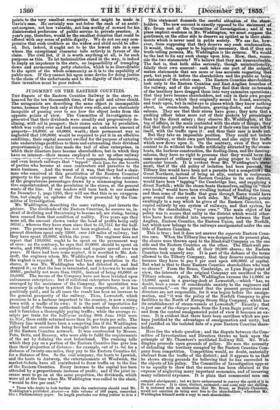A Il:RAT, (MAIM TO REWARD.
IT is not because we do not see the justice and even the policy of giving to past service a full recompense, that we object to giving sinecures as rewards, and to distributing distinction by some un- recognized principle. On the contrary, we insist that office-shoal. be given for duty, rewards for past services. Moreover, we say that a great country should see that merit never goes without its meed, although the reward may not be down in the bond. It all depends upon the service done. The best servant will be a man who does not look to his wage or his profit, but does the task for
the sake of seeing a good task done! duty of him for whom the benefit is executed is, to see that the gene- rosity of the servaucs is met by the generosity, of the master.
We have a case in point, which is all the better since it is ge- nerally appreciated and is indisputable. It is the case of Dr. Hector Gavin, whose services and death are well known. lie was cut off early in his profession ; he leaves a wife and a child; their olaims are morally beyond all doubt, and something should be, done for them ; but there is a technical 'fault in their claim. Al- though Gavin was suddenly out short in active service, he was a
commissioner, not a surgeon nor an assistant-surgeon; and he died from a cause not arising out of the service' but out of an accident. There is, it seems, no precedent in office for giving anything to- his widow.
This is inconceivable as a matter of reasen, though, unhappily, it is too conceivable as a matter of routine. If any justification could be advanced for a Colonelcy to one who has but gone through the regular series of duties, the very same justification applies in this case. We look to service. Gavin was one of the few physi- cians who, when sanitary matters became of public importance, gave up private practice and devoted themselves to sanitary re- searches. Younger, and perhaps less gifted than Southwood Smith, he did his work with equal zeal. He took a part in all the earlier and unrecorded Metropolitan movements for sanitary reform • and when the Health of Towns Association was formed, he became the unpaid editor of their official organ, the _Health of Towns Journal. His usefulness and his position were afterwards recog- nized by his appointment as Medical Inspector during the cholera outbreak of 1849 in the Metropolis, and as Medical Inspector in the West Indies in 1853-'4, and.iin Newcastle and other towns in the North in 18M. These empayments show that the Govern- ment did not scruple to use the fruits of Gavin's personal devotion to sanitary knowledge and that they recognized his standing as a sanitary reformer. In the early part of 1855—shortly after Lord Palmerston's accession to power—Gavin was appointed with Dr. Sutherland a Sanitary Commissioner to the Army in the Crimea, and there a chance pistol-shot out short his life. But it did not erase his services ; they remain on record. Their value is beyond question. In the present day, we want above all things good sanitary men, not mere "medical" men, but
men with a good ability for administering preventive measures. The proofs come to us every day. Sir Benjamin Hall gives tes- timony, in his exhortations to the local bodies who have visited him on the subject of municipal administration. "Dirt," says Lord Palmerston, "is matter in the wrong place"; dirt produces disease ; and we want men who, acting under "Nature," can matter in the right place. It is important that we should call
such men : the development of science produces them, and our thisk- ening town population essentially demands them. Simple pol then, would make us recognize the value of that service w both in honour and logic it is impossible to deny. How can we tell such men that they had better stick to their own profession, unless they would be punished by the chance of 'leaving their 'de- pendents destitute ? It is a common precept, that men should guard against the accidents of life by insurance : here the officials effect a kind of anti-insurance—they make the engagement pre- vent both the means and the chance of insuring the life for the benefit of dependents.
Office itself supplies precedents which tell 1 fortiori. Assistant- surgeons released from their duties in the Crimea or at Scutari are, we believe, entitled to a year's pay by way of donation. 'Ws points to the very smallest recognition that might be Made in Gavin's case. He certainly was not below the rank of an assist- ant-surgeon, not less valuable, not less worthy of reward for his disinterested preference of public service to private practice. A year's pay, therefore, would be the smallest donation that could be offered with any sense of public dignity. We do not see any com- promise that such creditors as the widow and child could be offer- ed. But, indeed, it ought not to be the lowest rate in a case where the exceptional character tells entirely in favour of the claim. The civil list, if it is worth anything at all, is for such purposes as this. To let technicalities stand in the way, is indeed to imply an impotence in the state, an impossibility of trampling down and surmounting petty obstacles, which is as discreditable to the spirit of the whole community as it is to the capability of public men. If they cannot hit upon some device for doing justice to the claim of the unfortunate and to the dignity of their country, their invention must be poor indeed.



























 Previous page
Previous page